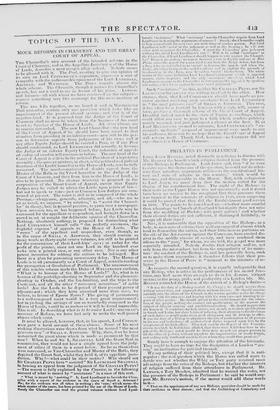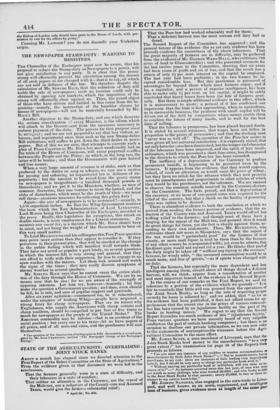PRELATES IN PA RLIAMENT.
Loan ,Ions RrssEi.L acted discreetly in refusing- to discuss with Mr. ls'r eteist the benefit whieli religion derived from the presence of the Bishops in Parliament. Lord JoeN said, that " if he were to enter upon the discussion of the 110 •scion, he emalld not do other- wise than introduce arguments relat i% it to the emilistitutional his- tory and state of religios in this country," which would be tiresome, and disagreeable to the Ilmuse. But, with submission to Lord Jousts we must deny that the motion called for the display of his constitutional lore. The right of the Bishops to their seats in the Upper Mime: was not questioned ; and it would have been no answer to the complaint that their presence there was inimical to the interests of religion in 1 S36, even supposing it could be proved that they did the Establishment good service in legs. The points to be considered are—whether more scandal than advantage to Church-of-England Christianity does not arise from the meddling, of' Prelate:; with party politics? and whether their clerical duties are not sufficient, if discharged faithfully, to occupy all their time?
Now, it is undeniable that the opposition of the Bishops, as a body, to measures of reform, their uniform support of abuses which tend to demoralize the nation, and their bitten ness as partisans on the side of the Aristocracy against the Commons, have excited dis- gust in the middle classes of society, and have rendered them odious to the " poor," for whom, we are told, the gospel was more especially intended. Nobody doubts that religion suffers, not only from the misconduct, but from the unpopularity of its minis- ters' the conduct of the Bishops is, and has generally been, such as to make them unpopular: it therefore follows that their pre- sence in the House of Peers is " inimical to the interests of re- ligion." As respects the second question, it is equally indisputable that any Bishop, who is active in the performance of his sacred func- tions, may find more than enough to do in his diocese, without mixing in the pomp, pride, and prodigality of a London life. Mr. RI PPON reminded the House of the extent of a Bishop's duties-
" It was the duty of a Bishop to visit his Clergy ; he should receive their_ without ostentation, and approach them without reserve. II' -116111.1 examine carefully into the affairs of the Church in the various parishes under his charge —seeing with his own eyes and hearing with his own eats—not trusting to re- ports of other parties. Ile should attend to the establishments for the educa- tion of the penile, making the conduct and qualifications of the masters the subject of diligent scrutiny and careful examination. Ile should inquire into the litne•qi of II candidates for holy orders, not merely as to their qualifications in Greek and Latin, but their halms of industry, their attention to the discharge of such ditties as would make them good clergymen and fit Bishops in office. It was the duty of a Bishop to administer the rite of confirmation to all persons in his see, and todiseli irg, all ecclesiastical duties imposed minim him by the acceptance of his high They it ol seen by the Ilerrt of the Commis- sioners to which lie had before alluded, that there were 1,!2 N benefices in the gift of the likhopiii; and it would be their duty to seek out proper persons to flit the office of pastors, without regard to the importunities of needy friends, and seeking only worth and merit in those whom they would thus promote."
Surely here is enough to engage the attention of the hierarchs. They ought to have no time fin' the dissipation of a London "sea- son," no inclination for political turmoil.
We say nothing of their political bias, except that it is anti- popular : the real question which the House was called upon to decide was not whether the Whig or Tory party received most advantage from the votes of the Bishops, but whether the interests of' religion suffered from their attendance in Parliament. Mr. LAWSON, a Tory Member, admitted that he wanted the votes, not the presence of the Bishops in Parliament : he said he would sup- port Mr. RIPPON'S motion, if the mover would add these words to it-- " That on the appointment of any new Bishops, provision should he made for their residence in their diocese; anti that the Archbishop of Canterbury and
Cunning Mr. LAWSON! you do not discredit your Yorkshire dread.



























 Previous page
Previous page